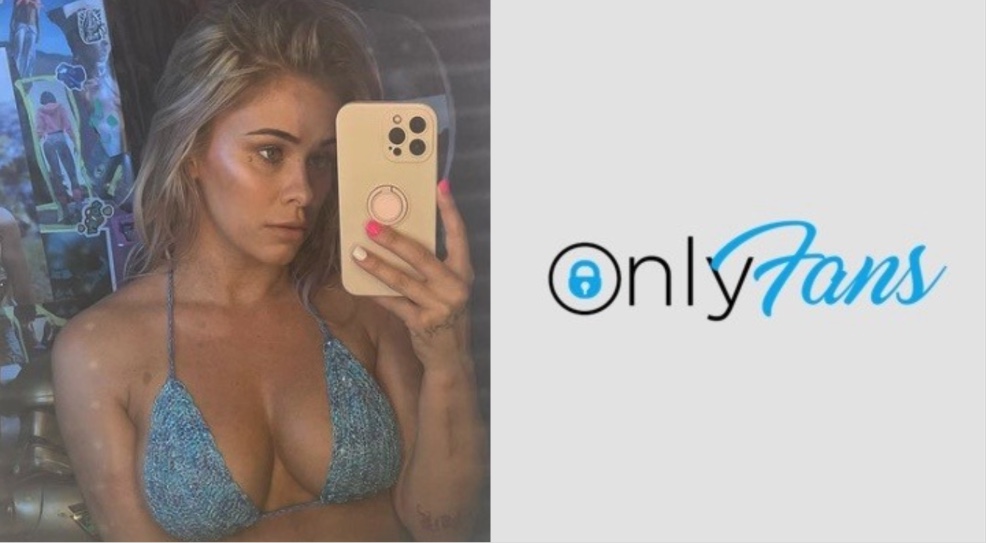Paige VanZant OnlyFans Leak: What You Need To Know & Aftermath
In an era dominated by digital platforms and content creation, can any online presence truly remain private? The leak of Paige VanZants OnlyFans content serves as a stark reminder that the boundaries of personal information are increasingly porous, and the consequences of digital breaches can be far-reaching. This incident has not only sent ripples through the entertainment world but has also ignited a complex discussion about celebrity privacy, digital security, and the ethical considerations of online content sharing.
The circumstances surrounding the leak of VanZant's OnlyFans content remain shrouded in some mystery. While the exact method of the breach is still under investigation, the consensus points toward a third-party compromise. This could have manifested through a variety of means, including data breaches, sophisticated hacking attempts, or even the exploitation of vulnerabilities within the platform itself. The incident highlights the inherent risks associated with digital platforms, particularly those dealing with sensitive or explicit content.
The impact of this breach extends far beyond the immediate shockwaves. It has compelled the industry to confront crucial questions about celebrity privacy and the ethics of explicit content sharing. This has sparked wide-ranging discussions about how to better protect the personal information of public figures. VanZant herself has responded, though the exact nature of her response, and its efficacy, remains a central point of analysis.
The incident, however, is not solely about VanZant's experience. It has brought to the forefront the wider vulnerabilities inherent in the digital age, affecting content creators across various platforms.
The unauthorized distribution of private videos and photos from VanZants account is a harsh illustration of the challenges content creators face. The leak of VanZants OnlyFans content serves as a reminder of the challenges faced by digital creators, who often find themselves in a precarious position, balancing the need to create and share content with the imperative to safeguard their privacy and personal information.
The incident serves as a cautionary tale for all creators, underscoring the importance of robust security measures and the constant need for vigilance. The ability to monetize content through platforms like OnlyFans has opened up new avenues for digital entrepreneurship, but it also demands a heightened awareness of the risks involved.
The OnlyFans platform, though not the primary focus of this discourse, undeniably holds a key role in this controversy. The breach has compelled a reevaluation of security measures. This reevaluation is not just limited to technological aspects, such as encryption and data protection protocols, but also encompasses broader issues of user verification, access control, and the identification of potential vulnerabilities within the platforms infrastructure.
In the online content industry, the importance of consent and respect for privacy cannot be overstated. The incident has once again brought to light the issue of privacy and consent in the digital world. As content creators, it is crucial to understand and uphold the principles of consent and respect for privacy when sharing information. The need for transparency and accountability from platforms is also a critical aspect of this discussion. The recent leak of Paige VanZants content on OnlyFans serves as a cautionary tale for all creators.
Despite the controversy, Paige continues to demonstrate resilience, standing firm in her decisions and addressing the situation with grace, as has been reported in many news articles. This narrative of adaptability serves as a testament to her strength and her capacity to navigate the complex world of public perception.
The recent scandal surrounding Paige VanZants OnlyFans venture has sparked a flurry of debates, from ethical concerns to the platforms role in modern digital entrepreneurship. The incident serves as a reminder of the challenges and vulnerabilities that creators face in the digital age.
The unauthorized distribution of private videos and photos is, at its core, an act of violation. It infringes upon the individuals right to privacy and can cause emotional and psychological distress. The impact of such breaches often extends far beyond the immediate moment of discovery, potentially causing long-term reputational damage, financial loss, and even legal ramifications. Moreover, the incident serves as a crucial discussion point for a range of issues that affect all creators.
The leaks, the conversations, the reactions all intertwine to create a complex web of narratives. The incident has also brought into sharp focus the role of social media and the digital echo chamber in amplifying these events. The virality of the leaked content, propelled by the very nature of the internet, underscores the challenges of controlling the dissemination of private information.
The landscape of digital entrepreneurship is one of constant evolution, with platforms like OnlyFans offering opportunities for creators to monetize their content and engage directly with their audience. However, this evolution has also brought with it a corresponding evolution of risk. The convergence of technology and content creation demands a careful consideration of the legal and ethical implications involved, as well as robust safeguards.
The OnlyFans leak is not an isolated incident; it is symptomatic of a broader trend. The frequency of such breaches in the digital age highlights the need for a proactive approach to security, privacy, and consent. The incident serves as a stark reminder that in the digital world, no one is immune to the potential for their personal information to be compromised.
The online content creation industry is vast and varied, encompassing everything from amateur creators to established celebrities. The economic incentives inherent in this industry can, at times, create a climate where ethical considerations are secondary to the pursuit of profit. This incident, therefore, serves as a critical reminder of the need for ethical conduct.
The core issue at hand, that of privacy and consent, demands a thorough examination. The very nature of digital content sharing involves a transfer of rights, and this transfer must be based on informed consent. Without this consent, any sharing of content becomes a violation. This is a legal and ethical imperative. The consequences of failing to adhere to these principles are significant, ranging from legal action to reputational damage.
The Paige VanZant OnlyFans leak has left an indelible mark on the online content creation industry, serving as a reminder of the challenges and vulnerabilities that creators face in the digital age. The incident raises questions about the security measures employed by such platforms, user responsibility, and the broader implications of digital privacy.
The discussion surrounding the VanZant leak is not simply limited to issues of security and privacy; it also engages with the role of the media and the public in shaping the narrative. The incident highlights the complexities of celebrity culture, the power of social media, and the interplay between public and private life in the digital age.
The leak of Paige VanZants content has prompted an industry-wide reevaluation of security measures, privacy protocols, and the overall responsibility of platforms to protect user data. The incident underscores the urgent need for stricter regulations, enhanced security protocols, and a greater emphasis on user education. The incident has also sparked a flurry of debates, from ethical concerns to the platforms role in modern digital entrepreneurship. The incident underscores the urgent need for stricter regulations, enhanced security protocols, and a greater emphasis on user education.
The unauthorized dissemination of private content often has far-reaching consequences, leading to emotional distress, reputational damage, and, in some cases, legal repercussions. The incident serves as a stark reminder of the vulnerability of digital creators and the potential for their personal information to be exploited.
In the wake of this incident, the content creation industry has been compelled to confront some uncomfortable truths about the state of digital security, the importance of consent, and the need for robust safeguards. The incident has served as a catalyst for change, pushing for greater transparency, accountability, and ethical conduct within the industry. The case of Paige VanZant serves as a potent reminder that in the digital age, the price of privacy is eternal vigilance.
This incident is also a testament to the challenges content creators face, as they navigate the complexities of digital platforms, audience expectations, and the constant threat of privacy breaches.
The incident is a harsh reminder that in the digital age, nothing is truly private, and the consequences of a breach can be profound and lasting. Its a call to action for platforms, content creators, and users alike to reassess their practices and prioritize security and privacy.
| Category | Details |
|---|---|
| Full Name | Paige Michelle VanZant |
| Date of Birth | March 26, 1994 |
| Birthplace | Dundee, Oregon, USA |
| Nationality | American |
| Height | 5 ft 4 in (163 cm) |
| Weight | 125 lb (57 kg; 8 st 13 lb) |
| Husband | Austin Vanderford |
| Occupation | Mixed Martial Artist, Bare Knuckle Boxer, Professional Wrestler, Author, Model |
| Notable Achievements | Former UFC Fighter, Currently signed with AEW, Published Author |
| Social Media | |
| Training | Team Alpha Male |
| Fight Style | Mixed Martial Arts (Striking and Ground game) |
| Major League | Bare Knuckle Fighting Championship (BKFC), All Elite Wrestling (AEW), Ultimate Fighting Championship (UFC) |
| Reference | Wikipedia |



Detail Author:
- Name : Sylvester Adams
- Email : dickens.susie@braun.net
- Birthdate : 2000-08-01
- Address : 73527 Fisher Divide Gaylordton, WV 59108
- Phone : 1-669-876-6426
- Company : Boehm Group
- Job : Parts Salesperson
- Bio : Voluptatem dolorem eos qui alias officiis. Dicta tenetur inventore eum voluptatibus tenetur et. Omnis inventore qui reiciendis nulla.